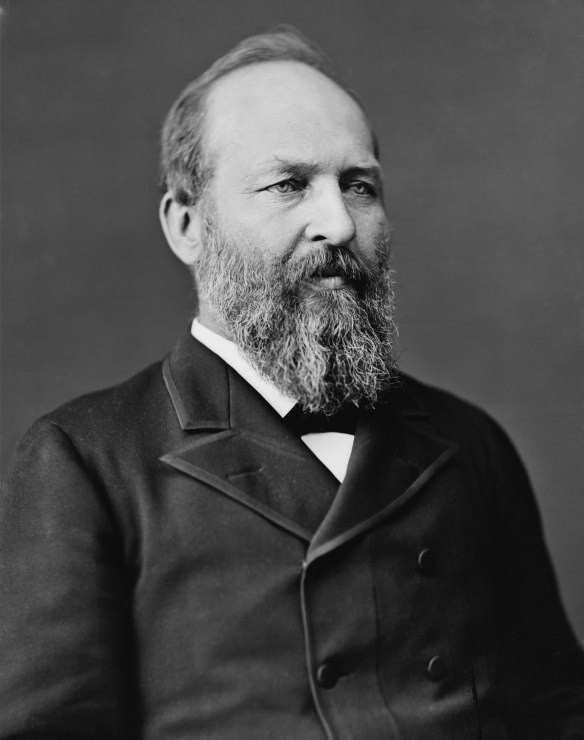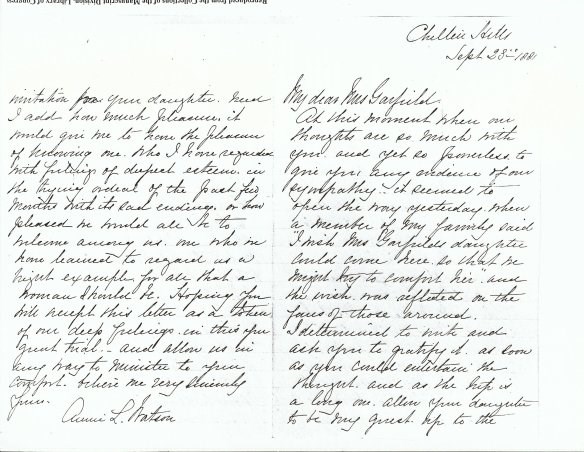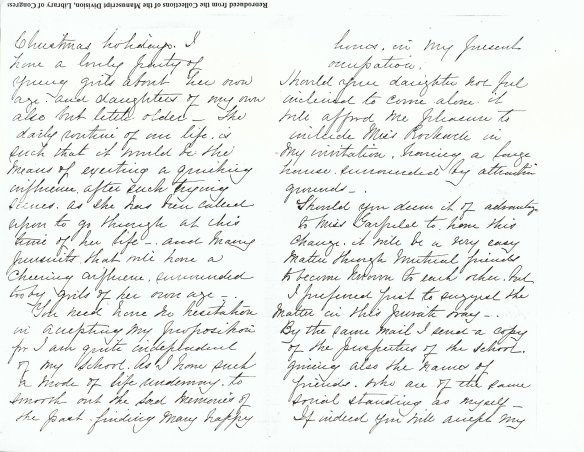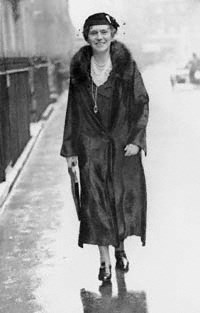Last updated: January 22, 2021
Article
“My Dear Mrs. Garfield”: Condolence Letters to Lucretia Garfield After the President’s Death, Part I

Library of Congress
A few years ago, while examining the papers of Lucretia Garfield at the Library of Congress, I came across hundreds of condolence letters to Mrs. Garfield. They came from people of all walks of life, and from many parts of the world. To read the letters is to be struck by the sentiments that are repeated over and over again. Writers were frequently sensible of intruding on Mrs. Garfield’s privacy. Phrases like the following appear repeatedly:
“My object in trespassing on your notice…”
“Pardon my intrusion…”
“I almost tremble at the thought of intruding upon your time…”
“Pardon the liberty I have taken in addressing you…”
“I beg you will pardon this unwarrantable liberty in addressing you…”
“I know it is wrong to trouble you in your great sorrow…”
“Hoping you will not deem it an impertinence…”

Library of Congress
Other themes that weave their way throughout the letters of condolence are President Garfield’s suffering, his fine character, and his eternal fame:
“Having lived for his country, died because of his firm convictions to duty and a
principle…”
“…for here their names [Lincoln’s and Garfield’s] were united in history…”
“…my great sorrow at the death of the Good, the Noble, and the Brave, the
Beloved President…”
“No one admired your noble husband more than myself…”
“…the name of Garfield [will be] to be a restraint on faction, and an incentive
to high and noble aims…”
“His sufferings have tried us all as in a fire, God grant we may come out
refined.”
“…he grew up to be a good man and always did his duty.”
“accept…[this] token of sympathy and sorrow for a good and great man…”
“We were satisfied with President Garfield and confident in the belief that his
administration would have given us peace and quiet.”
Of course, many contain strong spiritual or religious imagery and expressions of faith. Others ask for mementoes from the funerals, or for autographs of Mrs. Garfield, her husband, her daughter, and Grandma. Many letter writers offer Mrs. Garfield assistance, and others ask for her help.
Here is a small sampling of the many letters received by Lucretia Garfield. For ease of reading, spelling and punctuation have been corrected.
Winfield, West Va.
Sep 24th 1881
Dear Mrs. Garfield,
This morning while reading one of the many accounts of our dear President’s heroism and noble forbearance in his long illness, together with the feelings I have for some time been trying to control, so overcame me that I thought I would write and tell you how very, very much I felt for you in your deep affliction. I am a little girl twelve years old but I think you will receive my heartfelt sympathy.
I have not offered a single prayer I believe since our President was first shot but that the first and foremost petition was for his recovery. But our Father’s will be done for He knows best. We know that our Dear President has gone from our love, to the love of God and his angels. My papa and mama do not know that I have written this but I felt I must do it.
Your sincere little friend
Josey McLean
Another girl, Violet Markam,* composed the following letter:
Tapton House
Chesterfield[England]
September 23rd 1881
May a little English girl tell Mrs. Garfield how sorry she is to hear of the good President’s death? I have read in the “Girl’s own paper” how good he was when he was a little boy, and how he grew up to be a good man and always did his duty. We are all so sorry for you here, and our Queen is very sorry for you too. I hope a wicked bad man won’t shoot her. I send you my love, though I don’t know you. A book of mine, “The Lame Prince” says love always consoles.
Violet Markham
Accepting God’s will is expressed in letter after letter.
Sep 23
But oh! How sad today. The heavens weep and our tears fall over our dear departed Leader, but our loss is his gain. And Dear Mrs. Garfield … let us prove faithful & true to our Heavenly Father. Then we shall have a joyful meeting with Jesus & our dear friends in glory the beautiful home God has prepared for his people.
May God lead, bless, & protect you as a family
Yours with much love
Hattie E. Woodard
Please forgive me if I have done wrong in writing to you. I am a poor country woman.
Mrs. A. A. Woodard
Talbotton Ga
Sept 20. 1881
Mrs. James A. Garfield

Library of Congress
My Dear Madam
I sympathize very deeply with you & family in the loss of your noble great and good husband, General James Abram Garfield – but we have a great consolation in the belief that our loss is his eternal gain, for he was a good man, & loved the “meek & lowly Jesus.” I prayed often while he was sick for his recovery but the good Lord has taken him home, where we hope to meet him.
With highest regards &
Best wishes for yourself
I am your Obedient Servant
A.P. Watts, an Ex Confederate Soldier
The next letter, written on September 24, two days before Mr. Garfield’s Cleveland funeral, expressed the hope that had the President lived, reconciliation between the North and the South might have been achieved.
Mrs. Garfield and family,
…Coming from a section politically opposed to your late husband, we hope that you may the more fully recognize our deep sorrow and that our offering [a floral tribute] may be none the less acceptable and that it may in a small way bring the people of the two sections closer and more intimate, which we had fondly hoped would be one of the results of your good husband’s administration.
Again assuring you of our deep regret we are
Very Respectfully
Lounsbery, Hidden & Campbell

Library of Congress
Mrs. Garfield’s correspondents also offered assistance. Annie L. Watson, a teacher at Chiltern Hills, a school located in southeast England, suggested that Mollie Garfield be sent there to resume a normal life.
Chiltern Hills
Sept 23rd 1881
My dear Mrs. Garfield
At this moment when our thoughts are so much with you and yet so powerless to give you any evidence of our sympathy, it seemed to open the way yesterday when a member of my family said, “I wish Mrs. Garfield’s daughter could come here so that we might try to comfort her” and the wish was reflected on the faces of those around.
I determined to write and ask you to gratify it as soon as you could entertain the thought, and as trip is a long one, allow your daughter to be my guest up to the Christmas holidays. I have a lovely party of young girls about her own age, and daughters of my own also but little older.
The daily routine of our life is such that it would be the means of exciting a quieting influence after such trying scenes as she has been called upon to go through at this time of her life – and pursuits that will have a cheering influence, surrounded too by girls of her own age…
Should your daughter not feel inclined to come alone, it will afford me pleasure to include Miss Rockwell in my invitation, having a large house surrounded by attractive grounds…
By the same mail I send a copy of the prospectus of the school, giving also the names of friends who are of the same social standing as myself….Hoping you accept this letter as a token of our deep feelings in this your great trial – and allow us in any way to minister to your comfort. Believe me very sincerely yours
Annie L. Watson

Wikipedia.com
Condolences were sometimes accompanied by pleas for Mrs. Garfield’s assistance, some of which made discreet references to the fund that was collected in 1881 for the support of the Garfield family.
Oct 21st /81
Mrs. Garfield
Dear Madam, I wish to ask your assistance for a poor afflicted woman near us who, in September lost her husband with Consumption… He was a very industrious hard working man… and provided for a family of eight children…until… he died, leaving thirty acres of land with a mortgage of eight hundred dollars upon it. Mrs. Clark is a most excellent woman and mother, a good manager. If this mortgage could be paid her friends think there would be a possibility of keeping her children together.
Mr. Clark was a great Garfield man. He named his baby James Garfield but a few weeks before he died. And now Mrs. Garfield, would you…, [from] your great abundance that a great and sorrowing nation has so bountifully supplied [you] with – help this poor woman in her hour of sorrow and affliction?
I am your obedient servant,
Mrs. Mary Stiles
The condolence letters written to Lucretia Garfield tell us something the state of the nation in 1881, and the reaction from other nations. Though a terrible assault on the President had robbed the American people of the service of a “good” and “great” man, a devout people must acknowledge a just, wise, and ultimately merciful God. Many writers claimed to see in James Garfield the hope of a nation putting to rest decades-long hatreds. Still others associated personal calamities with the national tragedy. All responded with genuine compassion for Mrs. Garfield and her family. The Garfields’ grief was the nation’s grief, and their own. As at later times in history, so it was in 1881, as Americans and people the world over searched for understanding, compassion, and faith in the midst of the incomprehensible murder of President James A. Garfield.
*In later life, Violet Rosa Markham (1872-1959) became a writer, social reformer and administrator. During World War I, she was a member of the Executive Committee of the National Relief Fund, established to alleviate distress caused by the war. She was a vocal opponent of women’s suffrage. Among her friends were future Canadian Prime Minister, Mackenzie King, and John Buchan, the author of The 39 Steps, which was made into a film, by Alfred Hitchcock.
In Part II of this blog, the condolences of three men who lives had been touched by James Garfield’s will be offered.
Written by Alan Gephardt, Park Ranger, James A. Garfield National Historic Site, September 2013 for the Garfield Observer.
